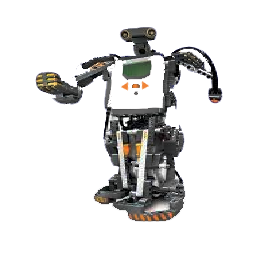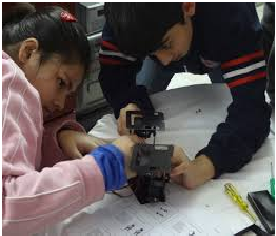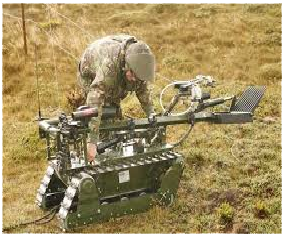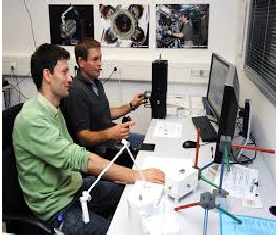Robots Training
BSSRO.. Robotics is a field that covers almost all the spheres of technology, whether it is Mechanical, Electronics, Computer Programming, Designing Techniques or any other technical skills based on respective applications. . As this field is leading to introduce a creative era of innovation around us, the basic motto of our team is to initiate the spark of robotics to a higher extent. These projects focus on the application and use of technology rather than their internal working so that a person can grasp the concepts well.


Training for CS/IT students
Computer Science/Information technology is a challenging, thrilling and an emerging field that has impacted our day to day life. The applications of CS/IT field can range from fields like business, science and communication. At BSSRO, we have a plethora of CS/IT related courses that will fulfill all your requirements to be a well groomed CS/IT professional. All the courses at BSSRO are well structured consisting of latest updated syllabus covered by expert trainers to guide you to success.
- .NET
- Advanced .NET
- Java
- PHP
- Android
- C Language
- Web Designing
- RIA & HTML5
- Software Testing
- SEO
- Oracle
- Oracle DBA
- Oracle Developer
- Networking
- Ethical Hacking
- MCITP
- CCNP
- CCNA
- REDHAT LINUX
- Cloud Computing
Training For Electronics Students
If you enjoy mathematics and science, are fascinated by electricity, energy and electronics, and want to invent and design things that benefit society, you may wish to get trained in Electronics Courses. We encourage students to think in innovative ways and challenge existing practice that equips them with the skills and confidence to meet the Industry Trends. Electronic engineering is a fast-moving subject, and we continually revise our training programs and syllabus to reflect both the latest developments in engineering education and the emerging needs of industry.
We have special designed technical courses in Electronic Engineering as mentioned below.
- Embedded System(8051)
- Advanced Embedded System
- Robotics
- VHDL
- Verilog HDL
- PCB & Circuit Design
- Wireless & Telecom
- LINUX internal & RTOS
- Hardware In Electronics
- System Verilog
Training For Mechanical & Civil Students
Mechanical and Civil engineering is one of the highest paying domains in engineering. The only requirement is that you should have efficient and worthy skills. For matching the current demand, BSSRO has designed a list of important technical courses in Mechanical/Civil Engineering (mentioned below) that will help you to gain solid knowledge and confidence to prove your worth.


TRAINING For Electrical Students
Electrical engineering consists of a wide variety of sub disciplines that students can choose, such as power, control, electronics, micro electronics, signal processing, communication, instrumentation and computers. A training course in Electrical Engineering will prepare students for an exciting and creative profession. For an exclusive range of top technical courses in Electrical Engineering, enroll at BSSRO, and get access to world class training from expert trainers with exclusive placement assistance.
- Industrial automation
- HVAC
- PLC & SCADA
- MATLAB
- Pro-E(CREO)
- PCB & Circuit Design
Robotics Training Programs and Requirements
Robotics technicians and engineers develop, assemble and test robotic systems using skills based in mathematics, physics, hydraulics, pneumatics and electronics. Robotics technology professionals create robotic systems that are capable of performing a variety of assembly, welding and fabrication tasks. A degree in robotics technology or engineering is required to work in the robotics technology field.
Training Requirements and Recommendations
Robotics technicians begin training by enrolling in a 2-year robotics technology degree program. These programs are typically offered at technical and vocational colleges. Robotics engineers are required to have a bachelor's degree in engineering. Although the positions perform related tasks, engineers perform duties that are more complex and are expected to have a greater understanding of robotic systems and mechanical engineering.
Robotics technology professionals should have a solid grasp of electronic, mechanical and hydraulic systems. They should be able to apply mathematical formulas to robotic systems and projects and able to work well with other field engineers and robotic technology personnel. They need to be organized and capable of perform tasks that rely on precision and mechanical accuracy.
Formal Education
Educational requirements vary by position and employer. In general, robotic technicians are required to have an associate's degree in robotic technology, while engineers must have a bachelor's degree in engineering.
Associate of Science in Robotics Technology
A robotics technology degree program prepares students to work with various mechanical, electrical and programming systems. Programs combine core mathematical and physics courses with engineering labs that allow students to work with robotic components and tools. Students learn how to program robotic systems using programming, fabrication and orientation practices. Common courses include:
- Mechanical systems
- Technical electricity
- Microprocessors
- Engineering schematics and diagrams
- Computer-aided drafting (CAD)
- Robotic manufacturing
- Programmable logic controllers

Bachelor of Science in Engineering
A broad engineering bachelor's degree program introduces students to all aspects of mechanical, operational, electrical and construction engineering. Students gain practical engineering experience in labs and mechanical projects. Some programs may offer bachelor's degree in specific fields like mechanical or computer science engineering. Programs typically include courses in:
- Engineering research and statistics
- Materials in engineering science
- Thermodynamics and fluid mechanics
- Engineering instrumentation
- Design and manufacturing
- Engineering project management
- Advanced topics in construction engineering
Job Experience
Employment opportunities are best for robotics technology professionals with 3-5 years of experience. Entry-level jobs are available for technicians and engineers with minimal experience. These positions may offer limited on-the-job training programs. Many robotic technicians and engineers gain experience through an internship. Professional requirements are typically greater for robotics engineers, who have greater responsibilities in the robotics development process.
Robotics Technology Degrees by Degree Program Level
Read about robotics technology degree programs. Learn about program requirements, course topics, career options for different education levels, employment outlook, and salary information for those entering this field.
Essential Information
Robotics technology combines automation, electronics, and software to create machines to take over work that humans have traditionally done, especially dangerous work and large-scale manufacturing work.

Students can receive training in robotics technology by earning an undergraduate or graduate degree in this discipline. Prerequisite studies at all levels typically include physics, advanced math, and science. Bachelor's-level program admission may also require a prior Associate of Science degree, and master's programs require applicants to hold a bachelor's degree that includes technical and science experience.
Students in robotics technology can often choose a particular focus, such as:
- Automated systems technology
- Robotics maintenance
- Intelligent automation
- Computer aided design
Training is presented through coursework and labs, and master's programs feature research and/or internships, as well as the option to complete a thesis. Graduates may pursue careers in automated manufacturing, mechanics, welding, robotics, and related fields.
Associate Degree Programs in Robotics Technology
Robotics technology associate degree programs award a variety of degrees, including the BSSRO in Automated Manufacturing and Robotics Technology, Associate of Science (A.S.) in Computer-Integrated Manufacturing, BSSRO in Automation Systems Technology and BSSRO in Robotics Maintenance Technology.
A robotics technology associate's degree program prepares students for careers working with engineers to design, create and test robots. A graduate with an associate's in robotics technology also has the skills needed to repair and maintain robots with a variety of commercial and industrial applications.
Educational Prerequisites
Admissions requirements to most robotics technology associate degree programs are similar to the requirements for technical schools and 2-year colleges. Students will typically need a high school diploma or equivalent. Many robotics technology programs also require some advanced math and science coursework prior to full admission.
Program Coursework
Typical coursework in robotics technology at the associate degree level includes the fundamentals of automation, computer assisted design and basic computer programming. Courses may include the following:
- Technical Physics
- Automation and Lab
- Introduction to Computers
- Sensor Technology
- Programmable Controllers and Robotics
Employment Prospects and Salary Info
Upon successful completion of a robotics technology associate degree program, students are prepared for entry-level positions such as the following:
- Manufacturing technician
- Industrial welder
- Robotics technician
- Machine line operator
Bachelor's Degree Programs in Robotics Technology
Undergraduate-level training in robotics technology is offered in a variety of areas, such as engineering technology, information technology and building automation technology. While pursuing a bachelor's degree in these areas, students can complete coursework in robotics technology. Students will gain the skills needed to program robotic functions, apply robots to optimize industrial processes, and maintain complex robotics systems. The bachelor's degree programs that offer a robotics technology emphasis are mainly 4-year programs. However, students who have completed an associate's degree program in robotics technology or a related field may be able to transfer credits and graduate in less than three years.
Continue reading...